Professional Courses
Industry-relevant training in Business, Technology, and Design
Categories
Interactive Games
Fun games to boost memory, math, typing, and English skills
Typing
Memory
Math
English Adventures
Knowledge
Chemistry Chapter Breakdown for the JEE Advanced Syllabus
Chemistry Chapter Breakdown for the JEE Advanced Syllabus
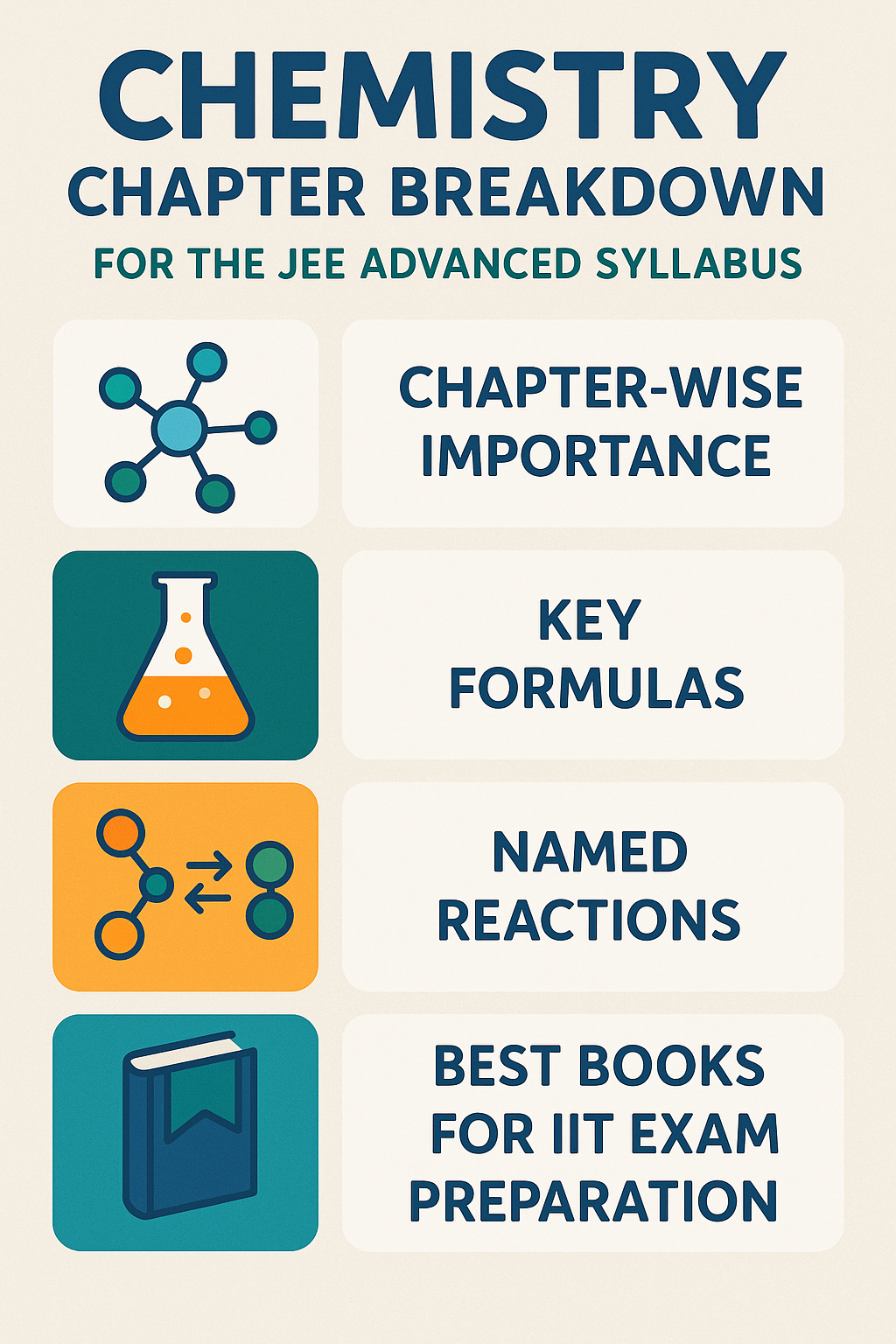
When it comes to JEE Advanced, Chemistry often feels like the most balanced subject. It is not as lengthy as Mathematics, nor as application-heavy as Physics. Yet, it plays a decisive role because many of its questions are either straightforward or moderately challenging. Students who prepare Chemistry smartly often gain an edge over those who underestimate it.
In the JEE Advanced syllabus, Chemistry is divided into three branches, Physical, Organic, and Inorganic Chemistry. Each has its own style of questions, preparation methods, and weightage. To crack the subject, you need to know which chapters are more important, which books are the most reliable, and which formulas and named reactions you must have at your fingertips.
This guide provides a chapter-by-chapter breakdown of Chemistry for JEE Advanced, ranking Physical, Organic, and Inorganic topics by importance. We’ll also include a quick reference for key formulas and named reactions that appear regularly.
Why Chemistry Matters in JEE Advanced
Many aspirants view Chemistry as the “scoring subject.” Unlike Mathematics or Physics, where questions are long and time-consuming, Chemistry often rewards knowledge of facts and concise application. Inorganic Chemistry, for instance, frequently includes direct questions from NCERT. Organic Chemistry tests reaction mechanisms and named reactions, while Physical Chemistry is formula-based and numerical.
Because it is less time-intensive, Chemistry allows you to balance your performance across all three subjects. Even answering 70–80% of Chemistry questions correctly can give you a significant rank boost.
The Official Chemistry JEE Advanced Syllabus
The chemistry JEE Advanced syllabus is comprehensive and spans both Class 11 and 12 concepts. Broadly, it includes:
-
Physical Chemistry: Mole Concept, Atomic Structure, Thermodynamics, Equilibrium, Electrochemistry, Chemical Kinetics, Surface Chemistry, and Solutions.
-
Inorganic Chemistry: Periodic Table, Chemical Bonding, Coordination Compounds, Metallurgy, Qualitative Analysis, s-Block, p-Block, d-Block, and f-Block elements.
-
Organic Chemistry: General Organic Chemistry (GOC), Hydrocarbons, Alcohols, Aldehydes, Ketones, Amines, Haloalkanes, Aromatic Compounds, Polymers, and Biomolecules.
Ranking Physical, Organic, and Inorganic Chemistry
1. Physical Chemistry
Physical Chemistry questions are typically numerical and formula-based. About 35–40% of the Chemistry paper comes from Physical. Important chapters are:
- Mole Concept & Atomic Structure: A must-master chapter, as it forms the base for numericals.
- Chemical & Ionic Equilibrium: Regularly asked, tricky but scoring with practice.
- Thermodynamics & Thermochemistry: High-weightage and concept-driven.
- Electrochemistry: Frequently contributes numerical questions.
- Chemical Kinetics: A consistent favourite in past papers.
- Less frequent but still important are topics like Surface Chemistry and Solutions.
Recommended Books:
- Physical Chemistry by P.W. Atkins (for theory)
- Physical Chemistry by O.P. Tandon (for practice)
- NCERT (must for basics and definitions)
2. Organic Chemistry
Organic Chemistry is considered the “deciding factor” in JEE Advanced Chemistry. It contributes around 30–35% of the paper. The focus here is on reaction mechanisms, logic, and applications. Important chapters are:
- General Organic Chemistry (GOC): The backbone as it includes concepts like resonance, inductive effect, and hyperconjugation which are tested everywhere.
- Hydrocarbons: Frequently tested, both aliphatic and aromatic.
- Alcohols, Aldehydes, and Ketones: A high-yield topic.
- Amines: Important for both mechanisms and direct questions.
- Haloalkanes & Haloarenes: Regularly tested for substitution and elimination reactions.
- Carboxylic Acids & Derivatives: Mechanism-based and predictable.
- Polymers and Biomolecules: Occasional, easy questions.
Recommended Books:
- Organic Chemistry by Morrison & Boyd (for in-depth theory)
- Organic Chemistry by O.P. Tandon (for practice)
- NCERT (for biomolecules, polymers, and named reactions)
3. Inorganic Chemistry
Inorganic Chemistry contributes 30–35% of the Chemistry section. It is both the easiest and trickiest branch. Easy, because questions often come directly from NCERT; tricky, because memorisation and revision are critical.
High-importance chapters include:
- Periodic Table & Periodicity: Conceptual and scoring.
- Chemical Bonding & Molecular Structure: Appears every year.
- Coordination Compounds: A favourite in recent years.
- s-Block & p-Block Elements: Frequently tested with direct NCERT questions.
- d-Block and f-Block: Regular contributors with both fact-based and conceptual questions.
Recommended Books:
- Concise Inorganic Chemistry by J.D. Lee
- NCERT Class 11 and 12 Chemistry (non-negotiable)
- Coaching notes for block elements and metallurgy
Quick Reference: Named Reactions You Must Know
Organic Chemistry questions in JEE Advanced often test named reactions. Key reactions include:
- Aldol Condensation
- Cannizzaro Reaction
- Kolbe’s Reaction
- Reimer–Tiemann Reaction
- Friedel–Crafts Alkylation & Acylation
- Sandmeyer Reaction
- Hoffmann Bromamide Degradation
- Gabriel Phthalimide Reaction
- Clemmensen Reduction
- Wolff–Kishner Reduction
- Rosenmund Reduction
- Wurtz and Wurtz–Fittig Reactions
Quick Reference: Key Physical Chemistry Formulas
Physical Chemistry questions are formula-heavy. Some formulas that frequently appear are:
- Mole Concept: n = w/M, PV = nRT
- Equilibrium: Kc = [products]/[reactants], Le-Chatelier’s principle applications
- Thermodynamics: ΔG = ΔH – TΔS, Enthalpy and Entropy relations
- Electrochemistry: Nernst Equation E = E⁰ – 0.0591/n log Q
- Chemical Kinetics: Integrated rate laws for 1st and 2nd order reactions
- Colligative Properties: Depression in freezing point, elevation in boiling point
High-Scoring Areas in Chemistry
Based on past JEE Advanced papers, the most reliable scoring areas are:
- Physical Chemistry: Mole Concept, Thermodynamics, Electrochemistry, Chemical Kinetics
- Organic Chemistry: GOC, Aldehydes and Ketones, Amines, Named Reactions
- Inorganic Chemistry: Chemical Bonding, Coordination Compounds, Block Elements, Periodicity
Students who master these areas often secure 70–80% of Chemistry marks.
Best Chemistry Books for JEE Advanced
- NCERT Chemistry (Class 11 & 12) – absolutely essential
- Morrison & Boyd – for Organic Chemistry theory
- O.P. Tandon – for Physical and Organic Chemistry practice
- J.D. Lee – for Inorganic Chemistry
- P.W. Atkins – for Physical Chemistry concepts
- Coaching modules (Allen, FIITJEE, Resonance) – for JEE-specific practice
Strategy to Master Chemistry for JEE Advanced
- Start with NCERT – especially for Inorganic and Organic basics.
- Divide time equally – don’t neglect any of the three branches.
- Practice numericals in Physical Chemistry daily.
- Make flashcards for Inorganic Chemistry facts and exceptions.
- Revise named reactions weekly.
- Solve past papers to understand integration between chapters.
Balancing Chemistry with Boards and JEE
The good news is that Chemistry overlaps heavily with school boards. NCERT is central to both. If you are in Class 11 or Class 12, you can prepare for boards and JEE simultaneously. For younger students of Class 9 or Class 10, focusing on NCERT early makes JEE Advanced Chemistry easier. Platforms like AllRounder.ai help build this foundation step by step.
Final Thoughts
Chemistry in the JEE Advanced syllabus is vast, but it doesn’t have to be intimidating. By ranking chapters and branches, you can prepare smartly. Focus on Physical Chemistry for numericals, Organic Chemistry for logic and named reactions, and Inorganic Chemistry for direct NCERT-based scoring.
Use NCERT as your bible, then add standard references like Morrison & Boyd, O.P. Tandon, J.D. Lee, and Atkins. Practice regularly, revise formulas and reactions, and solve past papers to gain confidence.
With the right balance, Chemistry can easily become your highest-scoring subject in JEE Advanced. Platforms like AllRounder.ai make the process smoother by combining board exam learning with IIT-focused strategies. Whether you’re in Class 9, Class 12, or anywhere in between, building Chemistry smartly will take you a step closer to your IIT dream.
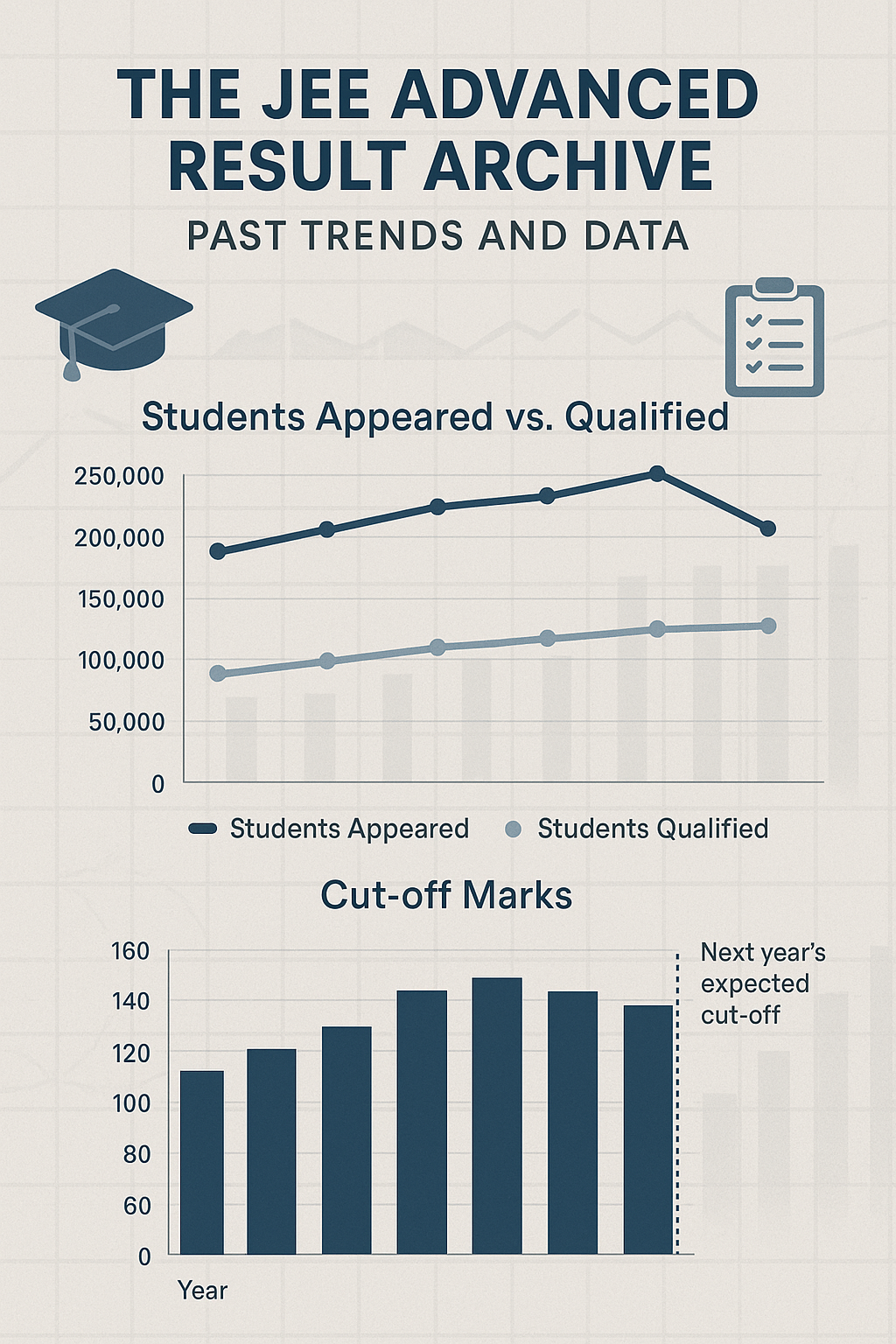
Explore the JEE Advanced Result Archive with past years’ data, insights on students appeared vs qualified, cut-off...
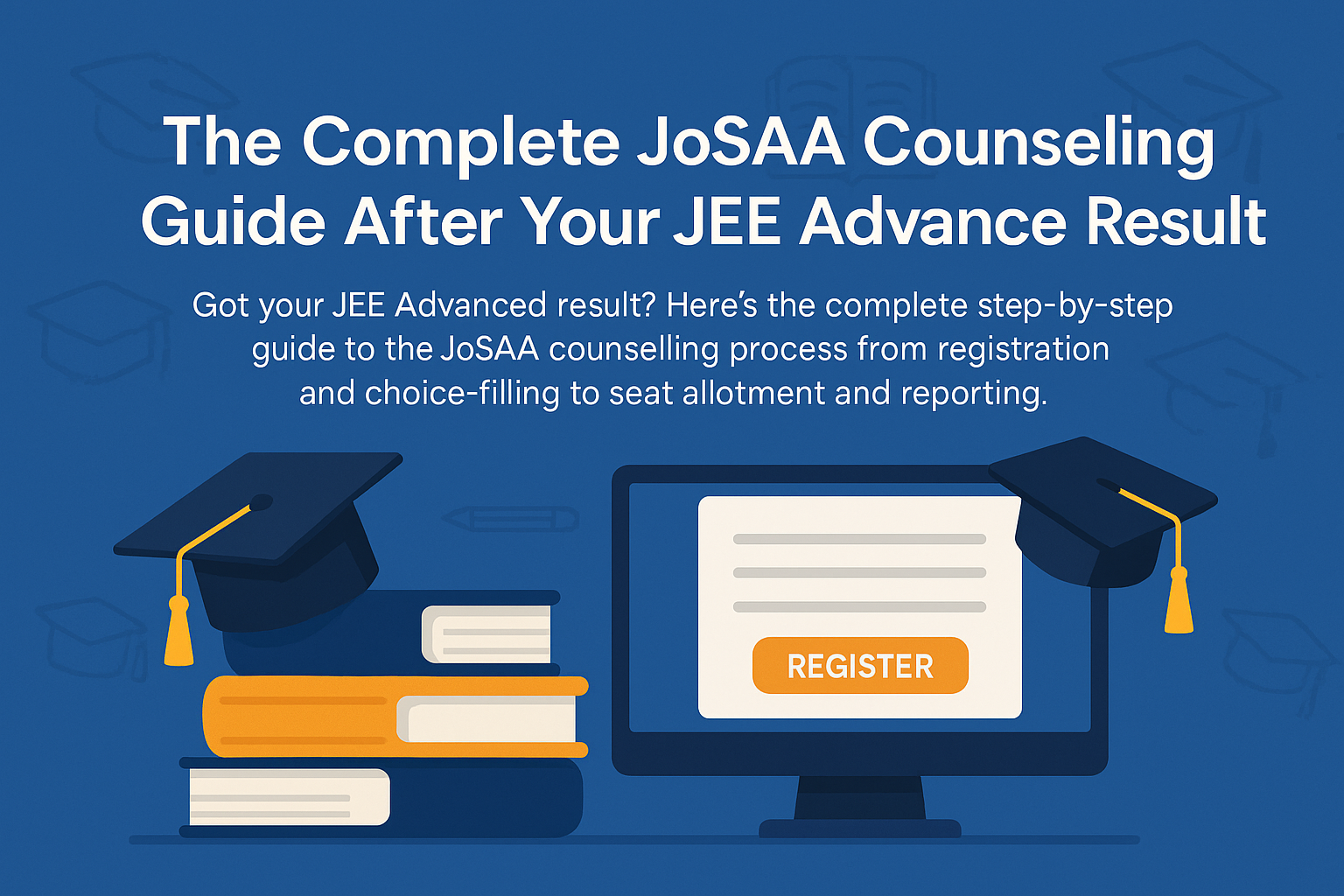
Got your JEE Advanced result? Here’s the complete step-by-step guide to the JoSAA counselling process from...
.jpg?width=500)
How many seats in JEE Advanced? Explore IIT seat distribution across all branches like CSE, Mechanical, Aerospace,...
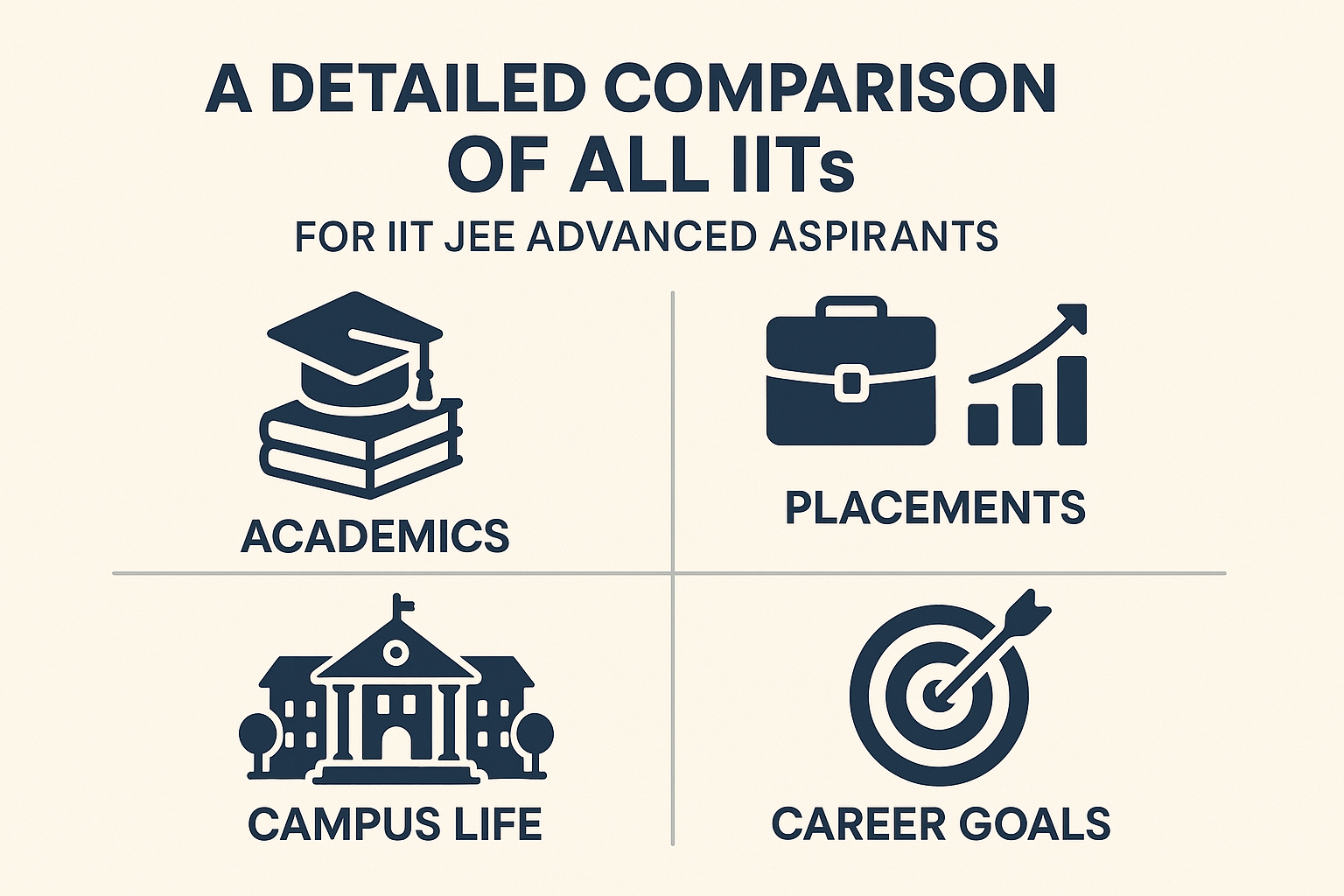
Compare all IITs for JEE Advanced aspirants. Learn about academics, placements, campus life, and find which IIT is...
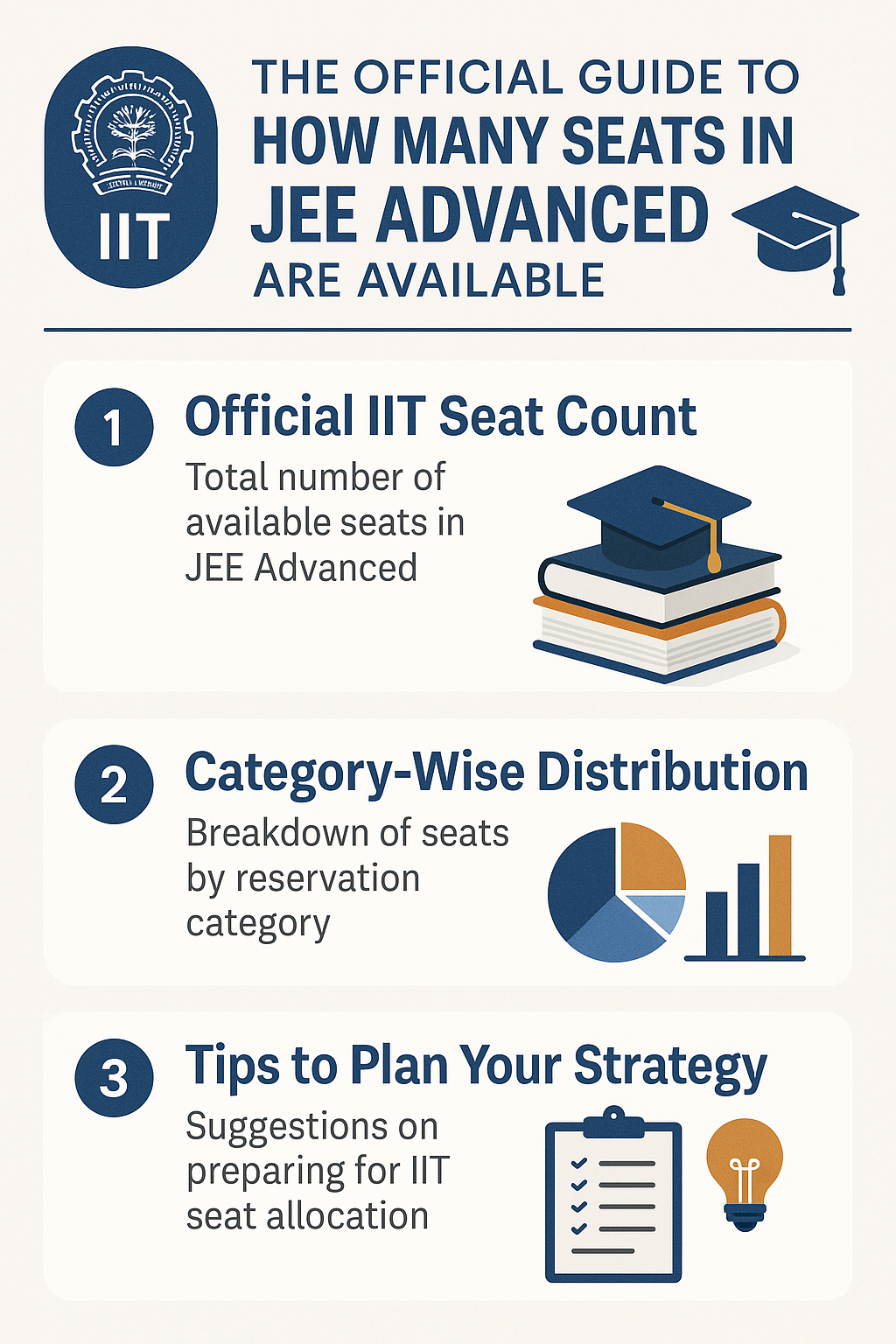
Wondering how many seats in JEE Advanced are available? Get the official IIT seat count, category-wise distribution,...

Explore the Chemistry JEE Advanced syllabus with chapter-wise importance, key formulas, named reactions, and the...
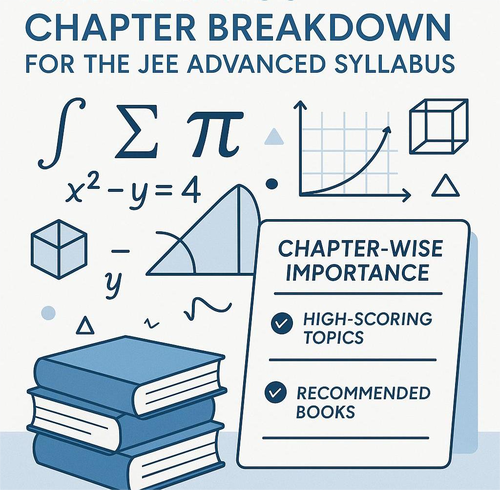
Explore the Maths JEE Advanced syllabus with chapter-wise importance, high-scoring topics, and the best books to...
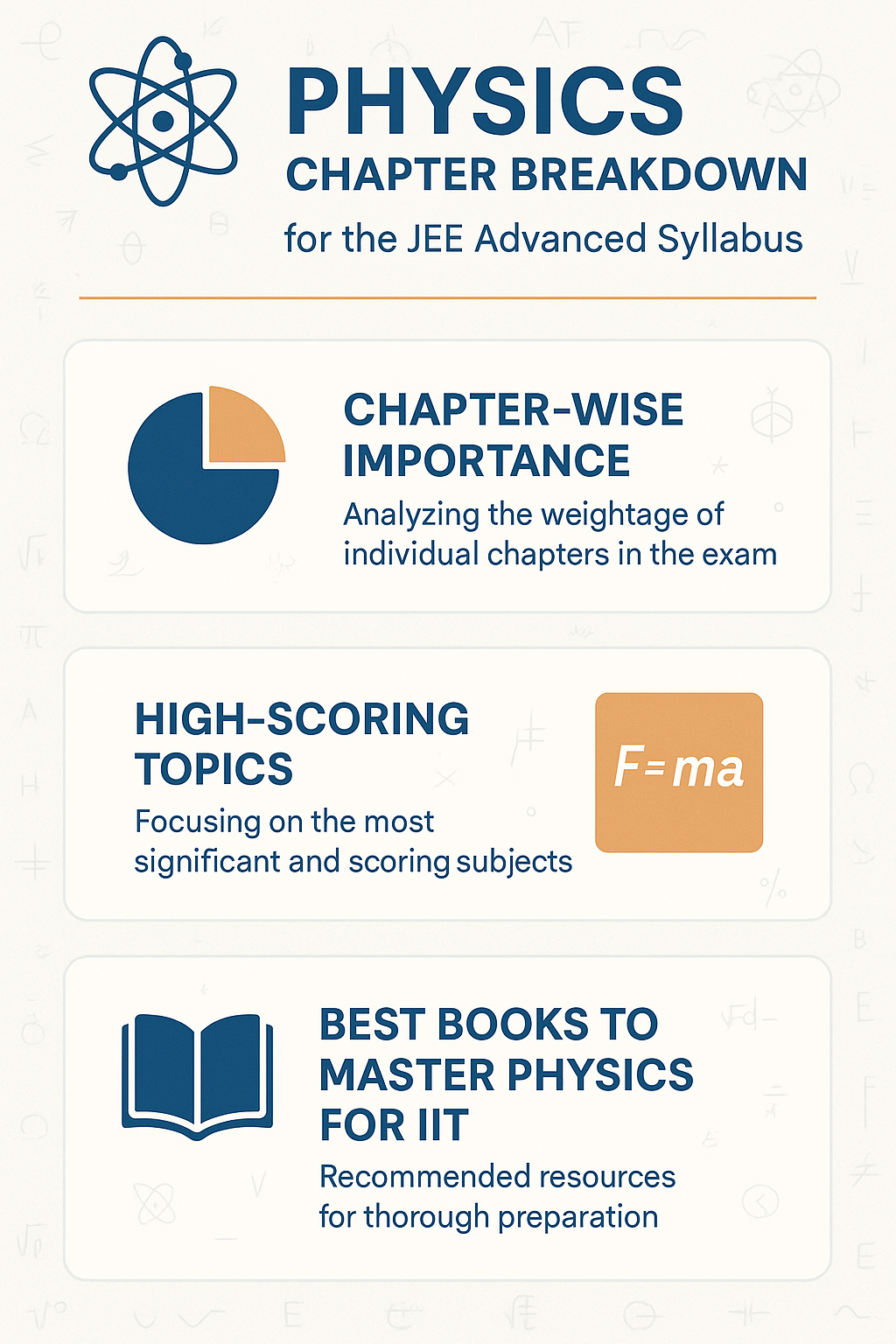
Explore the Physics portion of the JEE Advanced syllabus. Get chapter-wise importance, high-scoring topics, and the...
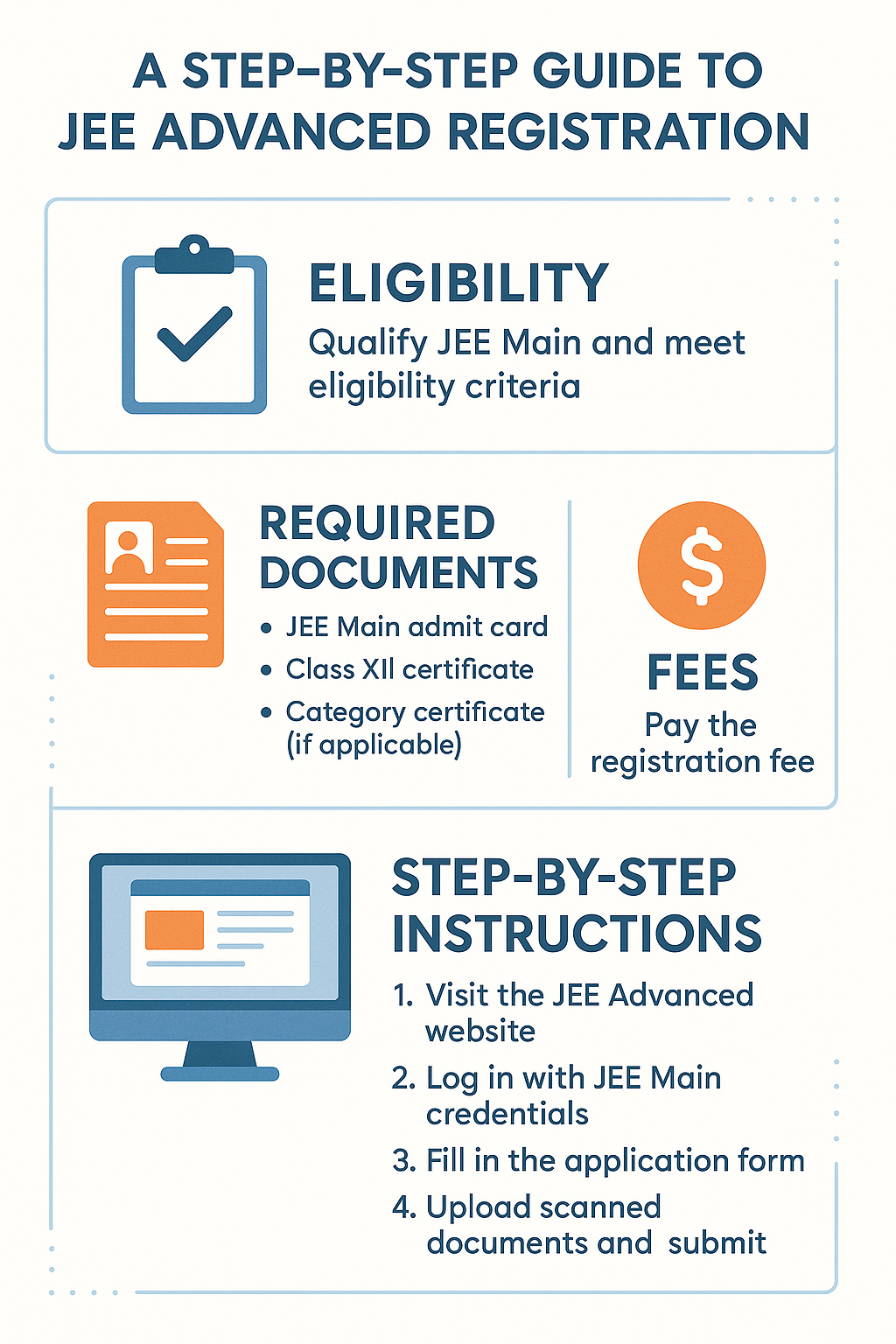
Learn the complete JEE Advanced registration process. Check eligibility, required documents, fees, and step-by-step...
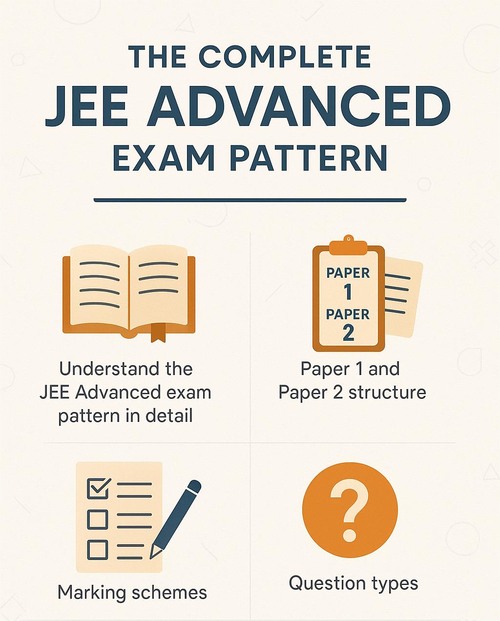
Understand the JEE Advanced exam pattern in detail. Learn about Paper 1 and Paper 2 structure, marking schemes,...

Find out the minimum percentile required for JEE Advanced eligibility. Learn category-wise cutoff trends, rules, and...
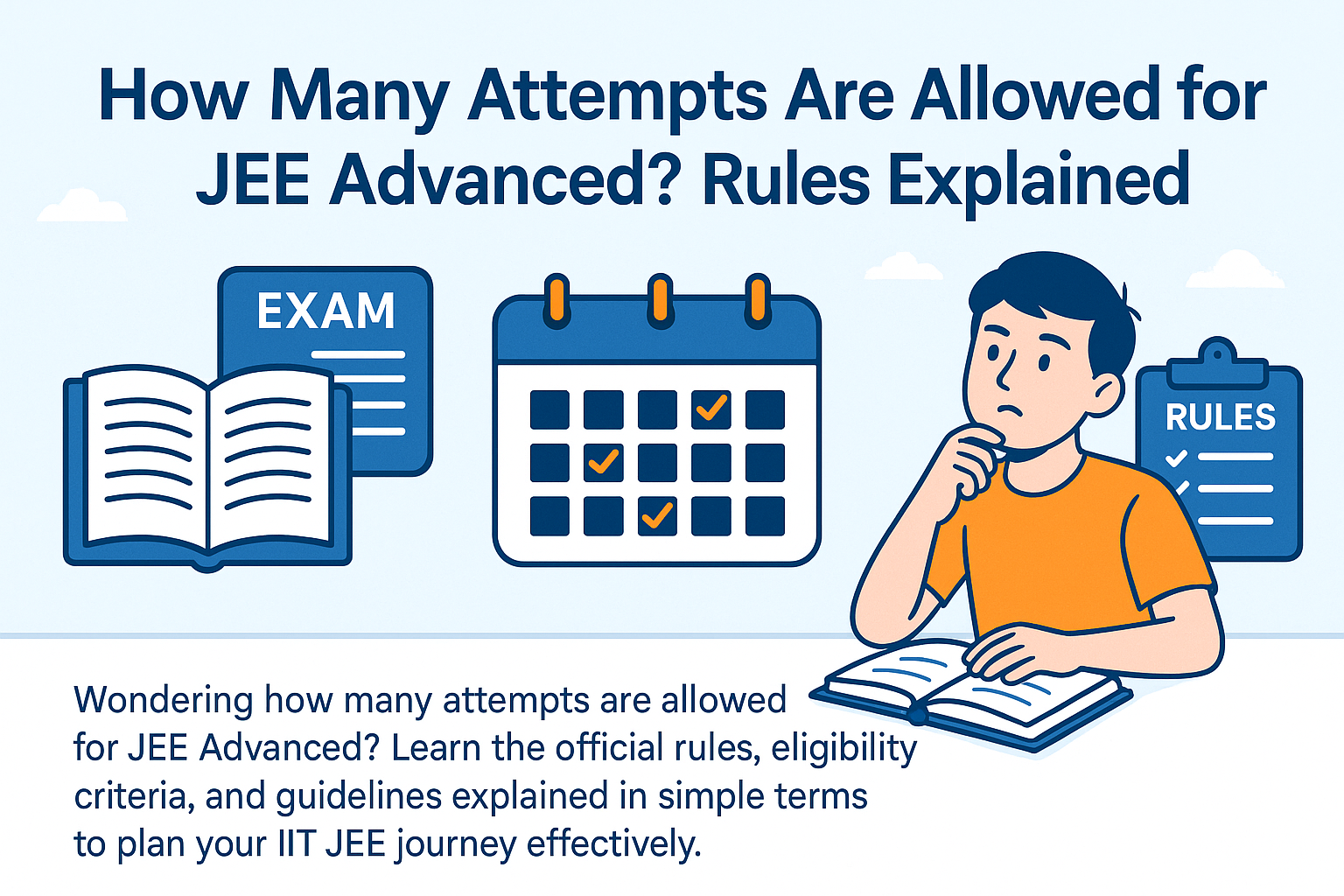
Wondering how many attempts are allowed for JEE Advanced? Learn the official rules, eligibility criteria, and...
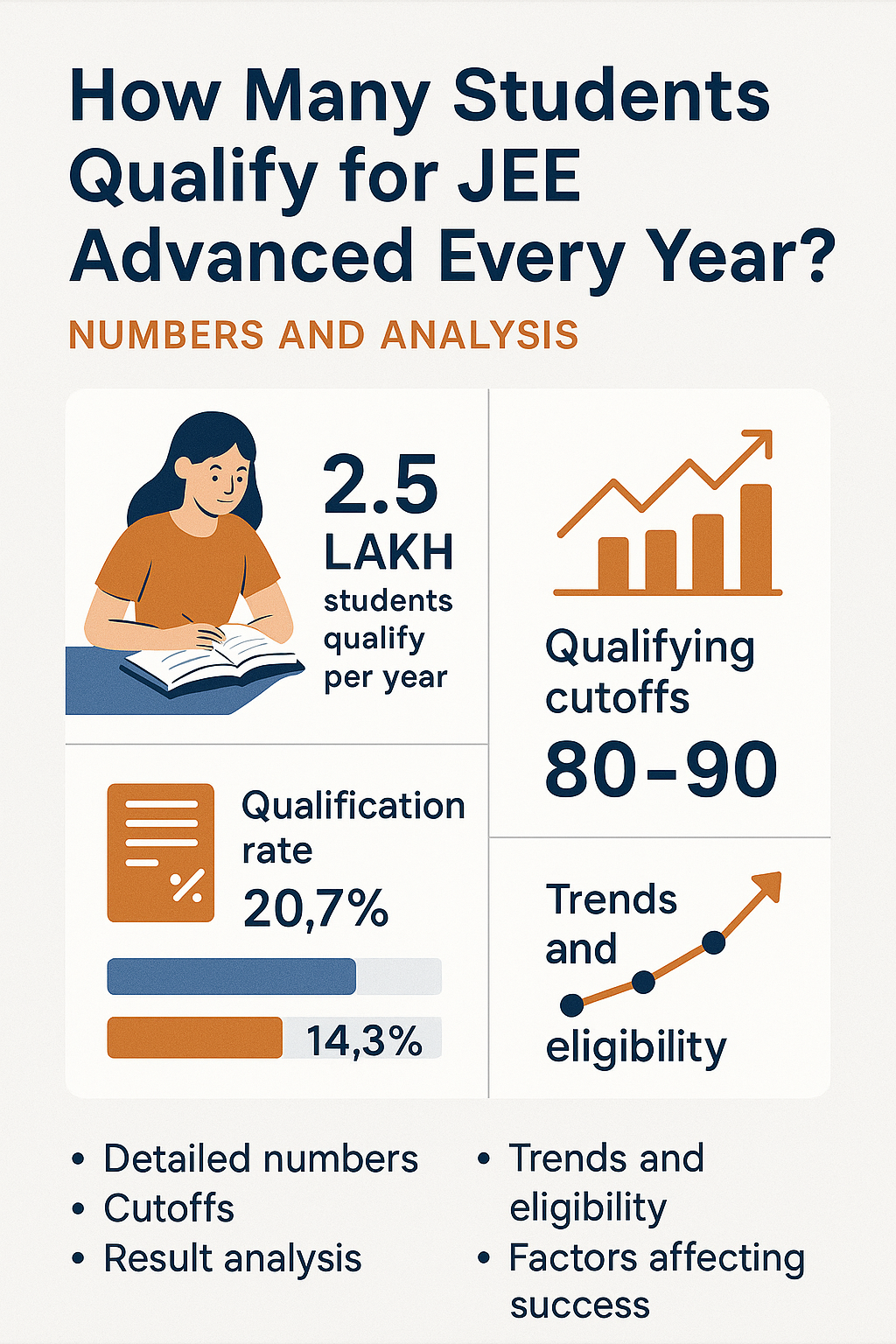
Discover how many students qualify for JEE Advanced every year with detailed numbers, cutoffs, and result analysis....

Stay updated with the latest JEE Advanced news. Get details on exam dates, registration process, results, and...
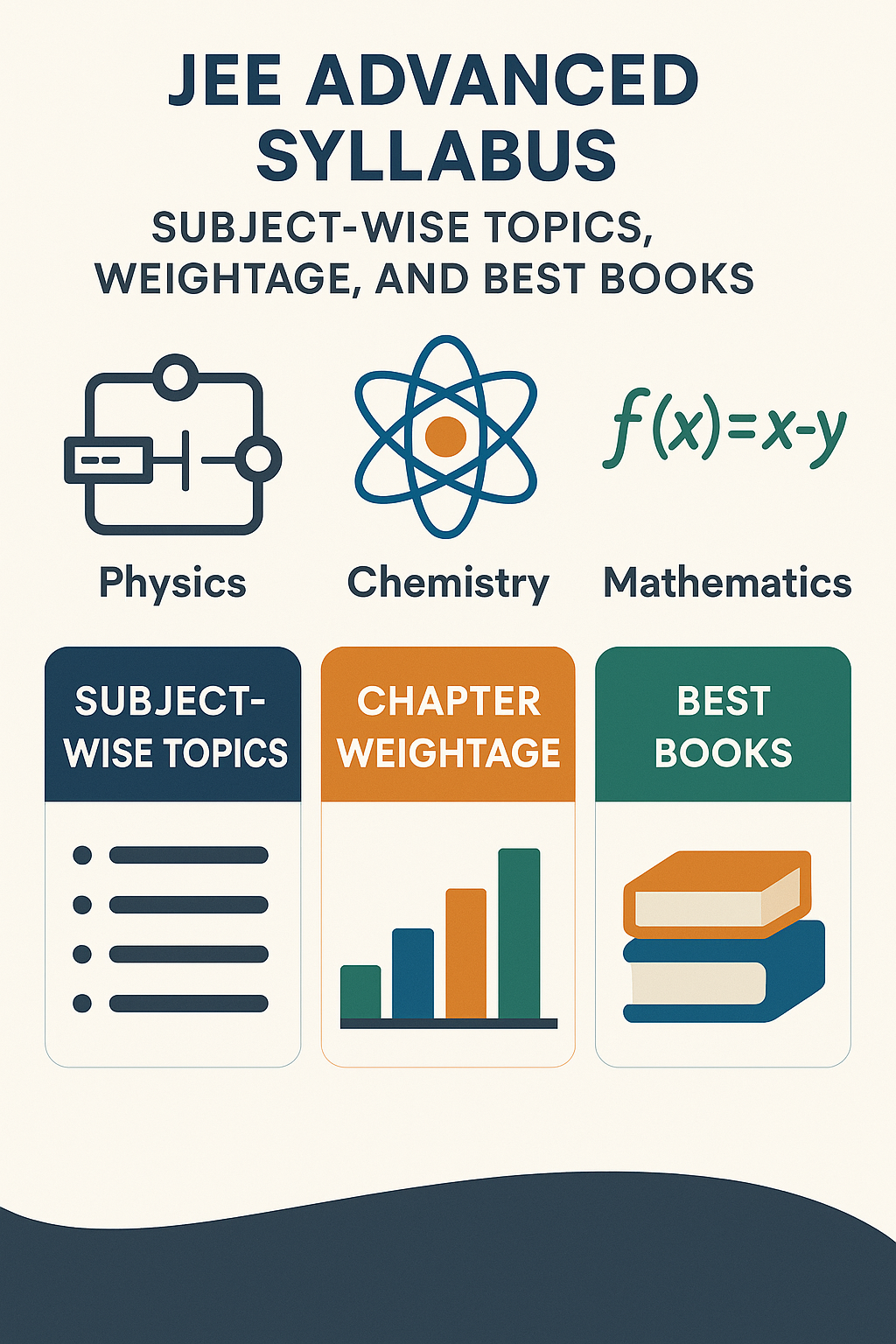
Explore the complete JEE Advanced syllabus with subject-wise topics, chapter weightage, and best books for Physics,...
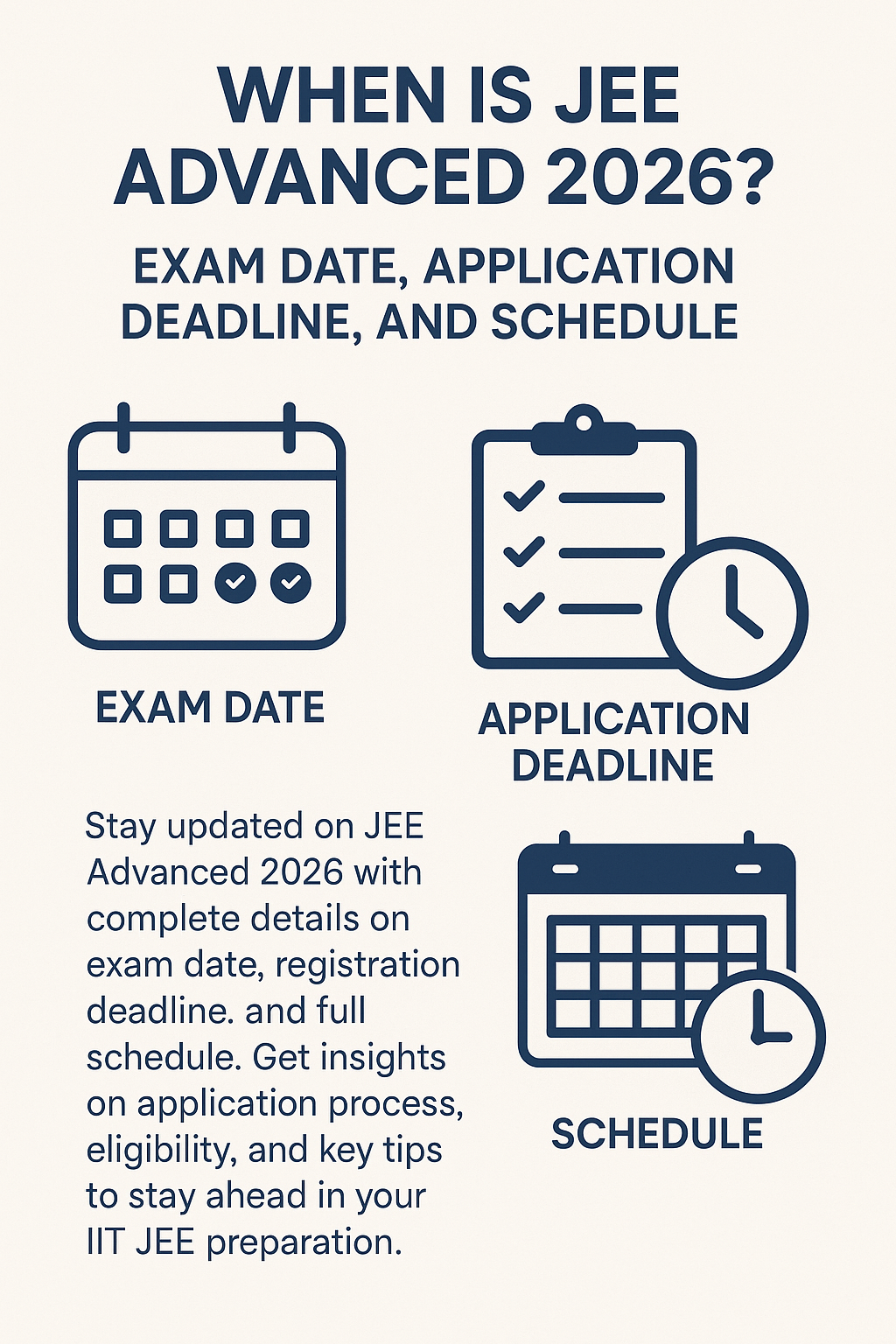
Stay updated on JEE Advanced 2026 with complete details on exam date, registration deadline, and full schedule. Get...
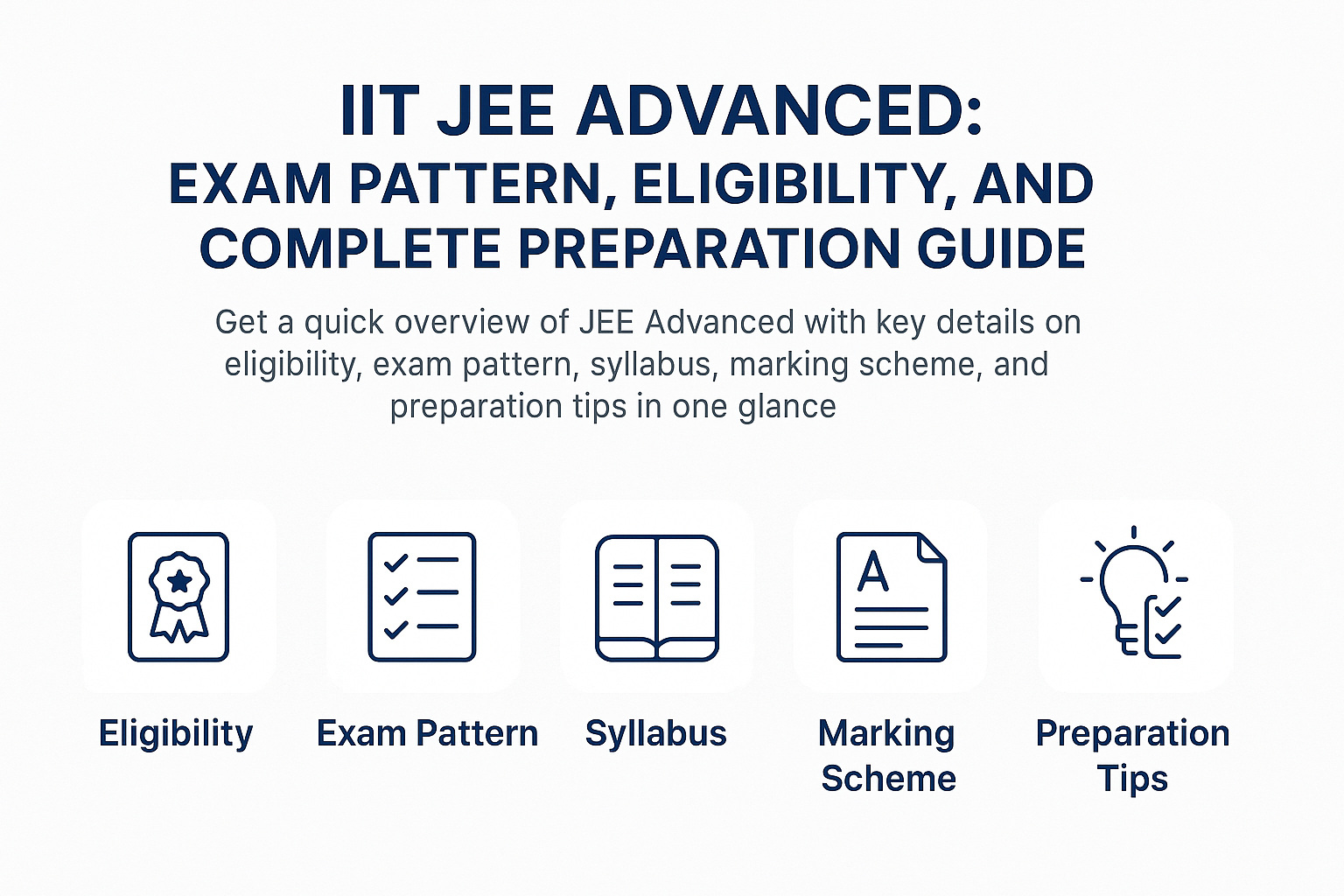
Get a quick overview of JEE Advanced with key details on eligibility, exam pattern, syllabus, marking scheme, and...
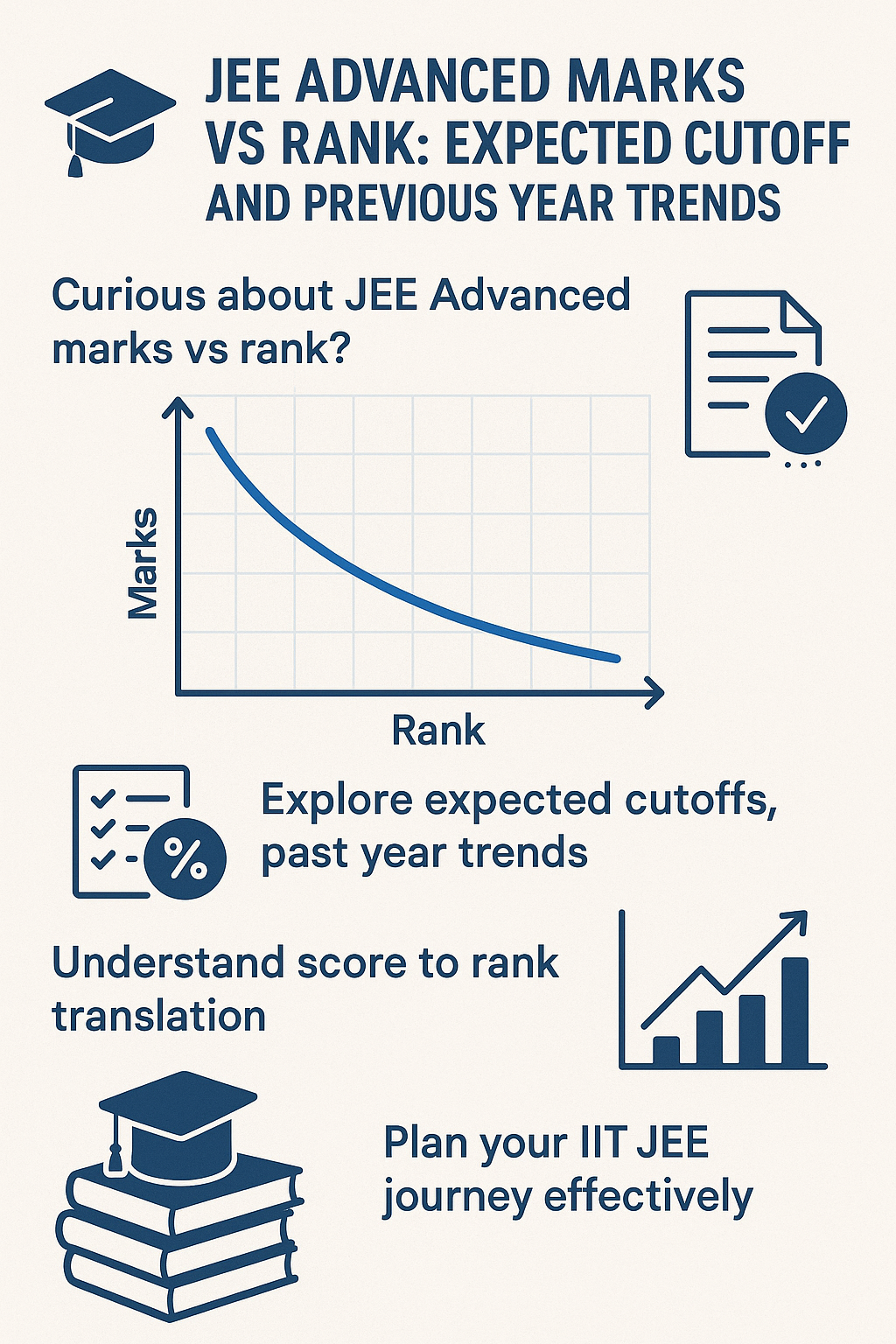
Curious about JEE Advanced marks vs rank? Explore expected cutoffs, past year trends, and how your score translates...
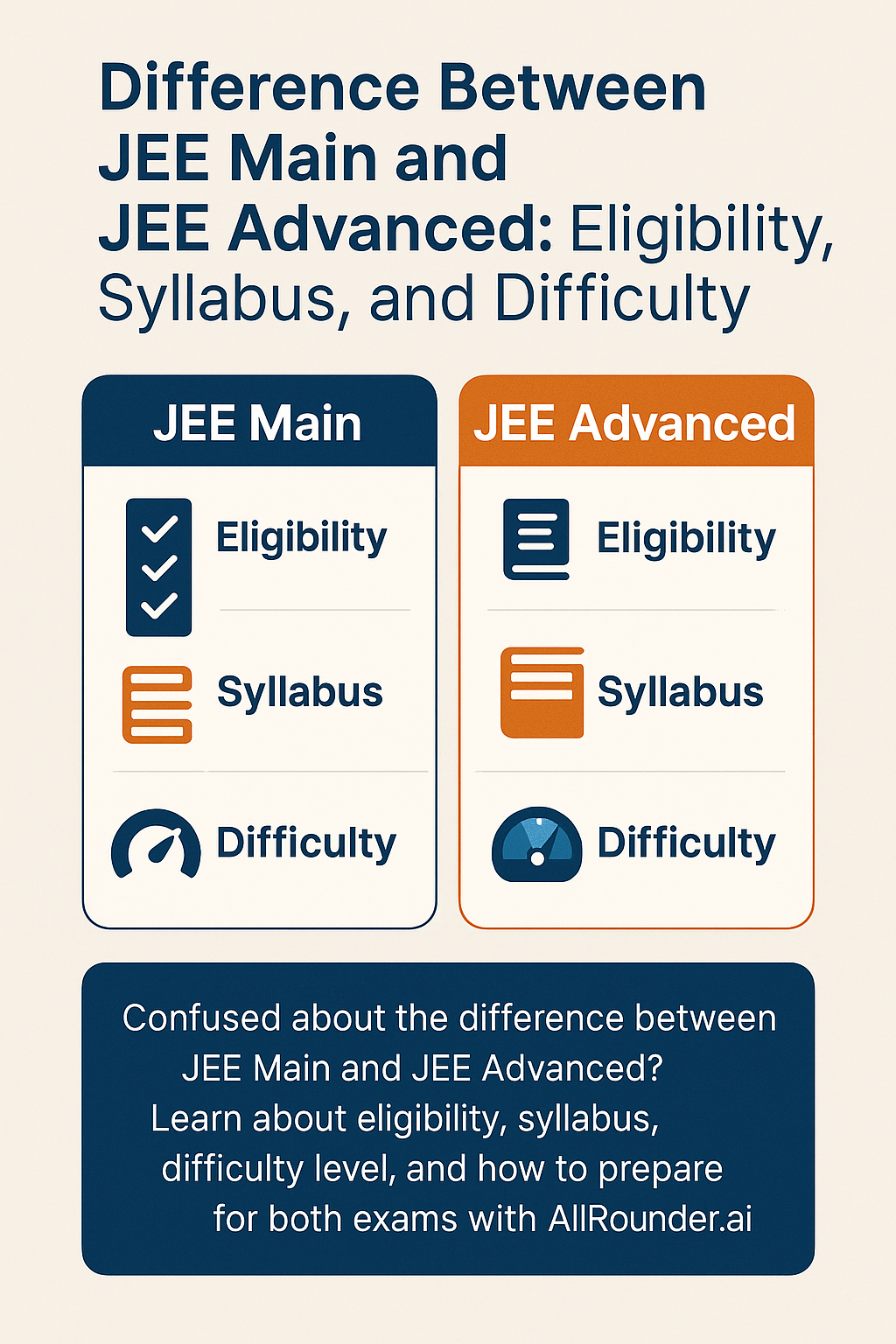
Confused about the difference between JEE Main and JEE Advanced? Learn about eligibility, syllabus, difficulty...
Resources
-
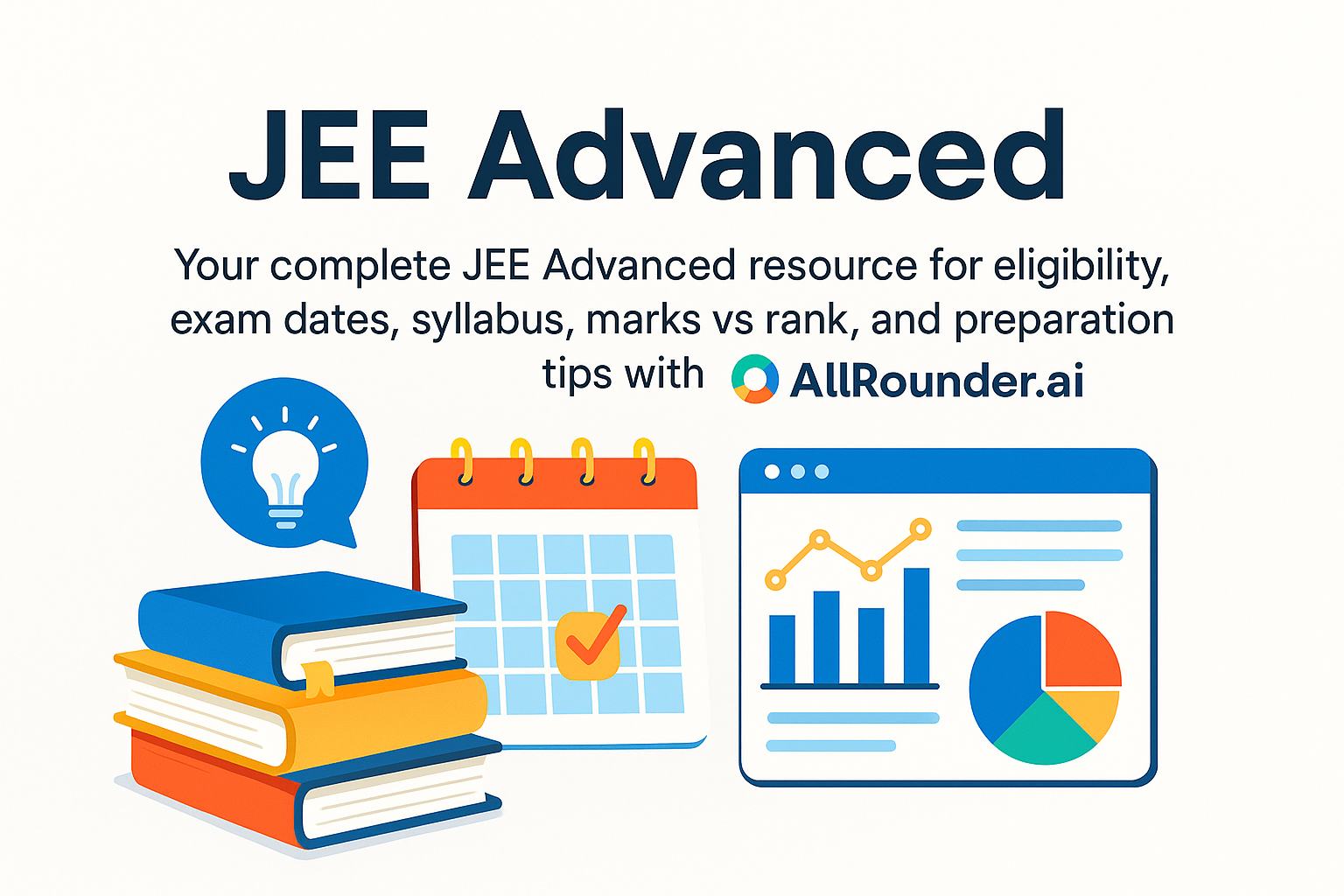
Your complete JEE Advanced resource for eligibility, exam dates, syllabus, marks vs rank, and...
-

Understand the entire JEE Main process, from application and eligibility rules to the exam...
-

Explore the IB Board – a global curriculum emphasizing holistic, student-centered learning...
-

Learn about CBSE – India’s national school board offering a standardized curriculum, NCERT...
-

Explore everything about the ICSE board – its curriculum, subjects, exam format, and academic...

